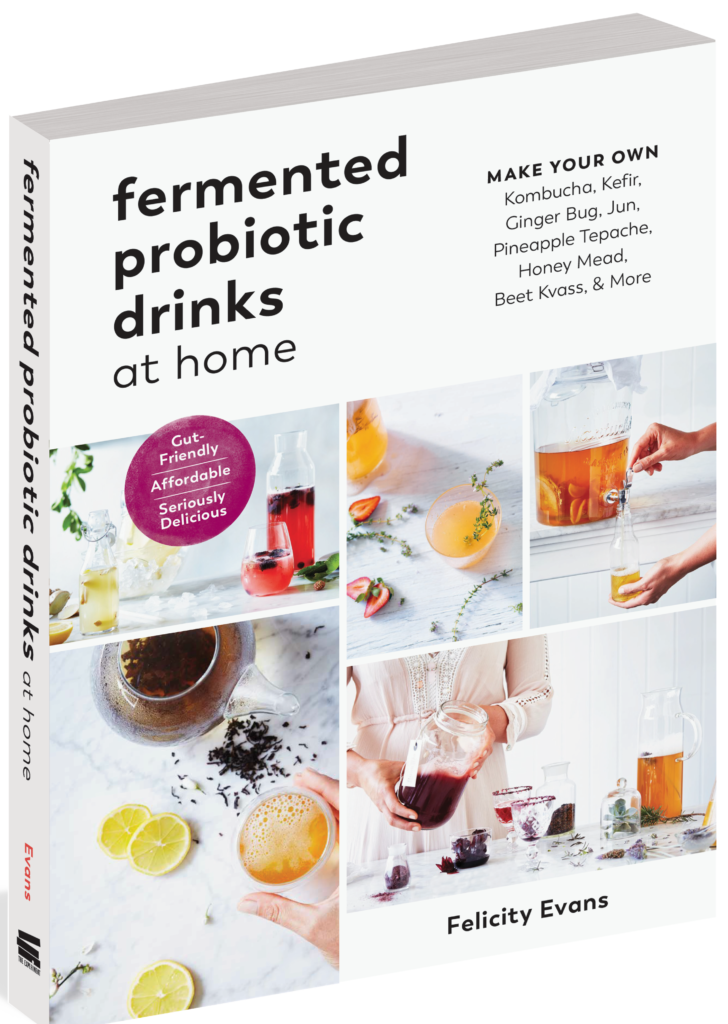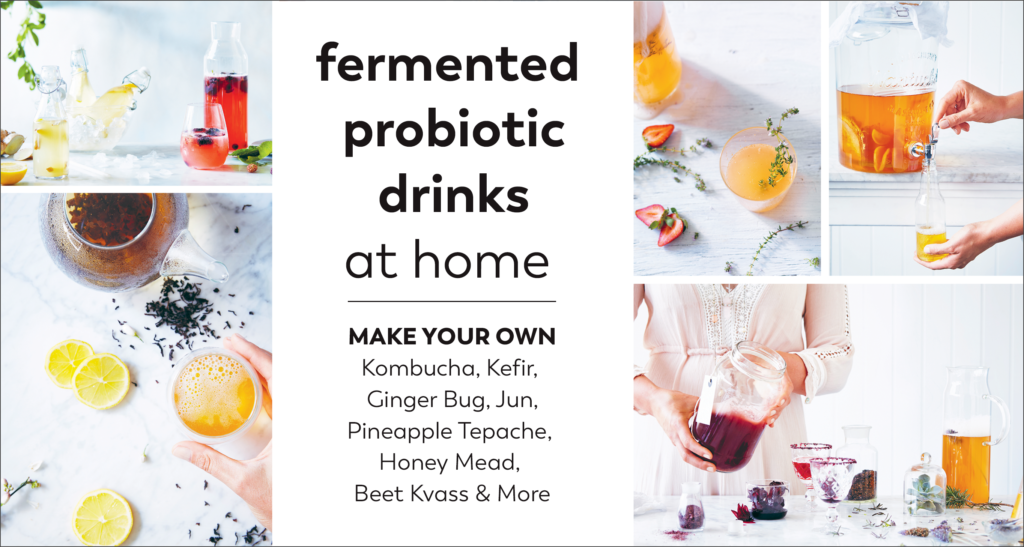You’ve probably heard of fermented probiotic drinks; kombucha is incredibly popular and terms like “gut health” are starting to seep into our vocabulary. Maybe you’ve only tried fermented probiotic drinks once or twice, maybe you’re a devout consumer. Either way, did you know that you can, relatively simply, make them at home?
 We’re so pleased to have just published Fermented Probiotic Drinks at Home: Make Your Own Kombucha, Kefir, Ginger Bug, Jun, Pineapple Tepache, Honey Mead, Beet Kvass, and More by Felicity Evans–a one-stop guide to making these drinks right in your own kitchen. Probiotics–the gut-friendly bacteria found in fermented foods–are a powerful superfood. They’ve been used for centuries to improve digestion, immunity, mood, and hormonal health. And now, self-taught fermentation guru Felicity Evans explains how to ferment them right at home.
We’re so pleased to have just published Fermented Probiotic Drinks at Home: Make Your Own Kombucha, Kefir, Ginger Bug, Jun, Pineapple Tepache, Honey Mead, Beet Kvass, and More by Felicity Evans–a one-stop guide to making these drinks right in your own kitchen. Probiotics–the gut-friendly bacteria found in fermented foods–are a powerful superfood. They’ve been used for centuries to improve digestion, immunity, mood, and hormonal health. And now, self-taught fermentation guru Felicity Evans explains how to ferment them right at home.
To celebrate the publication of her book, we spoke with author Felicity Evans about her history with fermented probiotic drinks, her process, and why these drinks are so important to our health. Read on for a Q&A with Evans and check out Fermented Probiotic Drinks at Home, available now wherever books are sold.
1. Probiotic drinks are obviously having a bit of a heyday—how were you first introduced to them and why have you made them such a staple in your diet?
I actually discovered the magic and power of probiotic drinks when I was down a rabbit hole of Google, in the middle of the night, trying to see what I could do to get well. I had a bout of illness and I was trying to reclaim my health. In doing research, to my surprise, I discovered that gut health is a cornerstone to overall wellness and one way to heal your gut is through living probiotic drinks. I ordered my first kombucha SCOBY and I’ve never looked back!
2. What is a SCOBY and how does it figure in to the process of fermentation? Where can people obtain a SCOBY?
A SCOBY is a “Symbiotic Colony of Bacteria and Yeasts” and basically is a shorter way of saying a culture.
For some fermentation (like kombucha, kefir, Jun, milk kefir) you need a SCOBY to start the fermentation process. You keep using the SCOBY, once you have it, it’s in your family and will bring you many years of gut-loving drinks! You will be surprised that a neighbor may have one, or you can also get them on Ebay and Amazon! Isn’t that cool!
3. Why do you think fermented probiotic drinks are having a moment now? Why haven’t they always been a major part of our diets?
As we try and come to grips with the enormous changes our diets and lifestyles have gone through over the past 100 years, we realize there is a missing piece—the state of our gut—which leads into nourishing it with probiotic drinks. I think they have always been a major part of our diet, we just forgot them, and now we are remembering them again.
Also, it’s so fun to ferment! I think we are reclaiming some fun and control in our kitchens—it’s almost like an act of political defiance to reclaim some part of our food production—and we can do this from any nook and cranny of our kitchen.
4. In the preface to your book you talk about following in love with the fermentation process—what, roughly, is the process?
It’s a magical process of blending raw ingredients, adding a culture, and letting time be your measurement to know when it’s ready.
5. Can you briefly explain the health benefits of probiotic drinks?
They are packed with easily digestible and absorbable enzymes, pre-digested nutrients so your body has an easy time digesting them and living probiotics. They really are a super food!
6. And why is gut health so integral to overall health?
Your gut is the cornerstone of good health in three main ways: digestion, immunity, and emotional wellbeing. Good health starts in the gut. The old adage “you are what you eat” is only partially true. You are what you absorb is a more accurate statement. You could have the most beautiful nutritious diet, but if your gut microbiota is weak and can’t absorb the nutrients from the food, what good is it?
That is where having good digestion is one of the keys to overall great health. The gut begins in the mouth and ends at the anus. The digestive system, if laid out, would be around the size of a football field and is crucial to overall great health. Without a well-functioning digestive system, your microbiota cannot properly digest and absorb the nutrients from that gorgeous healthy food you are eating.
The process of fermentation increases the nutrient profile and makes the food or drink much more absorbable and bio-available. You need to have a regular input of probiotics to help digest and absorb the nutrients from your food, and increase the number of good bacteria that are essential for good health. Prebiotics are also important because they feed the probiotics.
Whether we like it or not, we damage our digestive system daily, through medications, environmental toxins, food choices and more. It is vital that you do what you can to improve the functioning of this digestive system for overall good health.
7. Your book contains a wide variety of drinks to make at home—ginger bug, beet kvass, Jun, honey mead, etc.—is there one drink you recommend beginning fermenters start with or practice on?
I love to invite people to start with kombucha, because it really is a “set and forget” ferment that will be very happy in your kitchen corner—even if you have a tiny apartment, you can still brew your own kombucha because it won’t take a lot of space. Plus, it’s super fun to flavor! You get to be really creative, like blending seasonal ingredients to create a truly unique flavor that you are in love with!
8. In your book you mention handing down living cultures to your children—how is that possible?
Your culture will continue to live and grow, so you can peel off a layer and divide it up and give to your kids/friends and family and keep the heirloom going!
9. What would you say to people who are intimidated by the idea of making their own fermented probiotic drinks at home?
Just try! You will be surprised how quickly the bug bites when you start to glow and feel amazing!
Interview with Felicity Evans, author of Fermented Probiotic Drinks at Home: Make Your Own Kombucha, Kefir, Ginger Bug, Jun, Pineapple Tepache, Honey Mead, Beet Kvass, and More



